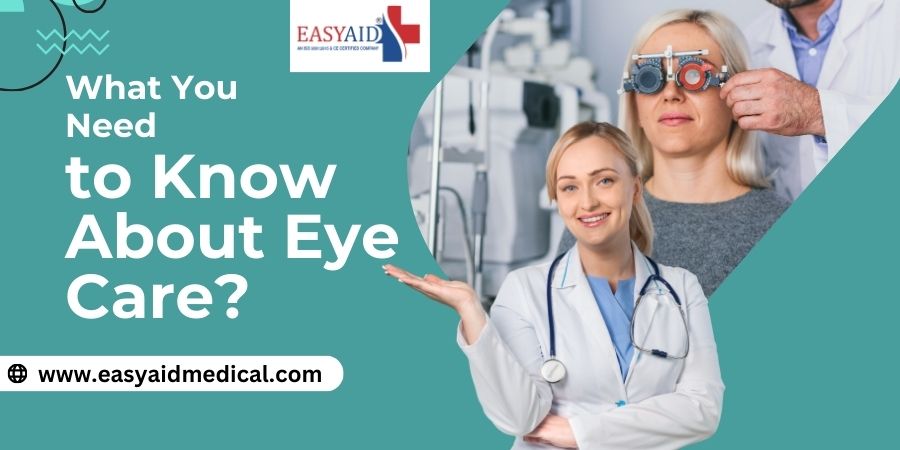What You Need to Know About Eye Care?
Our eyes are one of the most precious gifts we possess. They allow us to experience the world in all its beauty, from vibrant sunsets to intricate details in a loved one’s face. Yet, despite their importance, many of us take our eyesight for granted until an issue arises. In this blog, we’ll delve into everything you need to know about eye care, from understanding the anatomy of the eye to adopting healthy habits for optimal eye health.
Understanding the Basics of Eye Anatomy and Function
● Anatomy of the Eye:
The eye is composed of several essential structures: the cornea, which focuses light onto the lens; the lens, which further refines the light onto the retina; the retina, where light is converted into electrical signals; the optic nerve, which transmits these signals to the brain; and supporting structures like the iris, pupil, vitreous humor, and choroid. These components work harmoniously to facilitate vision, making sight one of humans’ most vital senses.
● How Does Vision Work:
Vision is a remarkable process that begins when light enters the eye through the cornea, passes through the pupil, and is focused by the lens onto the retina. Here, specialized cells called photoreceptors convert light into electrical signals. These signals are then transmitted to the brain via the optic nerve. In the brain’s visual cortex, these signals are interpreted, allowing us to perceive shapes, colors, and depths. This process occurs seamlessly, providing a rich and detailed understanding of the world around us.

Also Read- Eating for Energy: Nutritional Tips for Busy Live
Tips to Maintain Eye Health
Keeping your eyes healthy is crucial for maintaining good vision and overall well-being. Incorporating a few simple habits into your daily routine can help prevent eye problems and preserve your eyesight for years. Here are some tips for keeping your eyes healthy:
1. Follow a Balanced Diet:
A nutritious diet plays a crucial role in promoting eye health. Incorporate foods rich in vitamins A, C, and E and antioxidants and minerals like zinc and omega-3 fatty acids. These nutrients help protect against age-related macular degeneration (AMD), cataracts, and other eye conditions. Include colorful fruits, vegetables, leafy greens, fish, nuts, and seeds for optimal eye health.
2. Protect Your Eyes from UV Exposure:
Exposure to harmful ultraviolet (UV) rays from the sun can increase the risk of cataracts, AMD, and other eye conditions. Wear sunglasses with UV protection outdoors, even on cloudy days. Look for sunglasses that block 100% of UVA and UVB rays to shield your eyes effectively. Additionally, consider wearing wide-brimmed hats for added protection from UV exposure.
3. Practice Good Hygiene and Safety Habits:
Maintaining good hygiene and safety habits can help prevent eye infections and injuries. Wash your hands thoroughly before touching your eyes or handling contact lenses to reduce the risk of infection. When engaging in activities that pose a risk of eye injury, such as sports, DIY projects, or working with hazardous substances, wear protective eyewear, such as safety glasses or goggles, to prevent accidents.
4. Take Regular Breaks from Digital Screens:
Extended periods of screen time can contribute to digital eye strain, characterized by symptoms like eye fatigue, dryness, and discomfort. To alleviate strain on your eyes, follow the 20-20-20 rule: take a 20-second break to look at something 20 feet away every 20 minutes spent staring at a screen. Adjusting screen brightness and contrast, maintaining proper ergonomics, and using artificial tears can also help reduce digital eye strain.
5. Quit Smoking:
Smoking is linked to an increased risk of various eye conditions, including cataracts, AMD, and optic nerve damage. If you smoke, quitting is one of the best things you can do to protect your eye health. Smoking cessation reduces your risk of eye disease and offers numerous other health benefits. Seek support from healthcare professionals or smoking cessation programs to quit smoking successfully.
6. Get Adequate Sleep:
Getting enough sleep is essential for overall health and well-being, including eye health. Aim for 7-9 hours of quality sleep per night to allow your eyes to rest and rejuvenate. Poor sleep quality or inadequate sleep can contribute to eye fatigue, dryness, and irritation, affecting overall eye health and vision.
The Bottom Line
Regular eye exams are essential for maintaining healthy eyesight. Even if you have no apparent vision problems, scheduling comprehensive eye exams with an ophthalmologist can help detect early signs of eye conditions and ensure early intervention. Adults should aim for an eye exam at least once every two years or more frequently if their eye care provider recommends it.
Additionally, incorporating specialized products like eye serums into your skincare routine can provide targeted hydration, nourishment, and protection for the delicate skin around the eyes. Whether addressing fine lines, dark circles, or puffiness, investing in a quality eye serum can complement your efforts in preserving the health and appearance of your eyes.

